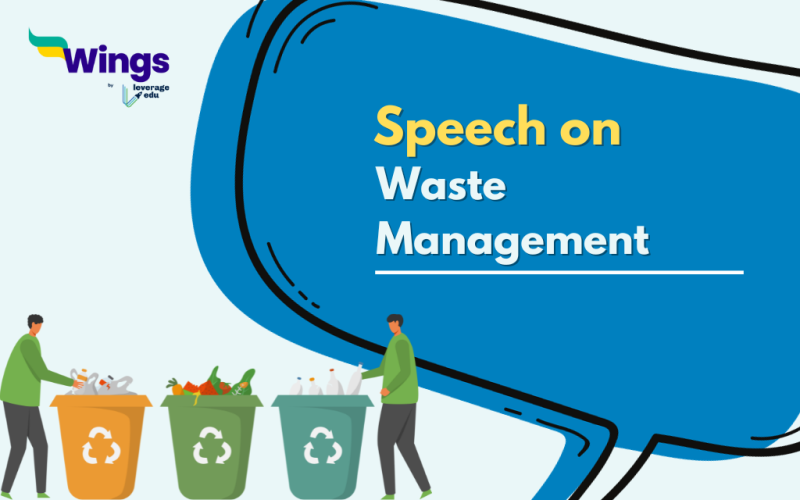Speech on Waste Management: Our world is changing fast, and the population is increasing day by day. People are doing their best for survival and finding every possible way to lead a comfortable life. But in between, there is a downside. All the items that provide ease to us and make us happy, somewhere, create waste. And what will happen if we don’t manage this waste properly? It will create a problem for our planet and for us too.
To manage the problem of waste, let us explore the challenges we face regarding the discard and the solutions that lie within our grasp.
Also Read: Career in Waste Management
5 Minutes Speech on Waste Management
Greetings to all the teachers and students gathered here. Today, I stand before you to deliver my point of view on the topic of waste management. In this blog, we will delve into the positive effects, statistics, health implications, technology and innovation, and the role of government in managing waste.
Our cities are expanding day by day, and our societies are becoming more consumer-oriented. In between the two positive situations, the volume of waste we are generating is also reaching surprising proportions.
Landfills are overflowing, oceans are becoming dumping grounds for plastic, and last but not least, the air we breathe is getting contaminated by dangerous emissions from the improper disposal of waste. As a result of this unchecked hazardous climate change, endangered wildlife, and threatening ecosystems are increasing, which is surely going to affect living creatures soon.
Now the question arises: what should be done to manage the waste? Though currently we humans deal with a linear model of take, make, dispose of,” is it sufficient with our regular increase in demands as well as a population?
Waste management is not a task only for government or environmental agencies. It requires the active participation of every individual in our communities. Awareness campaigns, educational initiatives, and empowering citizens to reduce, reuse, and recycle can make a big difference in the area of waste management. Actions like segregating waste at the source and practicing mindful consumption can have a positive impact on the environment when adopted collectively.
Moreover, leveraging technological advancements such as innovations in waste-to-energy technologies, recycling processes, and the development of eco-friendly materials is important in reducing the environmental impact of our waste. Collaborations between governments, industries, and researchers must be done to invest in and implement the technologies on a large scale.
Strict procedures must be followed while developing and executing policies. Also, the practice of penalising environmental violations and encouraging businesses to adopt eco-friendly alternatives should be encouraged. Industries should be taken into account for their waste generation and disposal practices. All these measures will shift towards a more sustainable future regarding managing waste.
As we know, education is the foundation of every change. To implement this fact, we must include environmental consciousness in our educational curricula and teach the younger generation about the importance of responsible waste management.
Waste management is not just a challenge; it is an opportunity for transformation into positivity. It is a chance to rethink our relationship with the environment and redefine our societal values, as the choices we make today will determine the legacy we leave for generations to come.
Also Read: Types of Waste Management
FAQs
Ans: The three golden rules of waste management are reduce, reuse, and recycle.
Ans: A waste management plan is a strategic approach to handling and disposing of waste. It involves identifying the types and quantities of waste generated, implementing methods to reduce, reuse, and recycle, and ensuring proper disposal.
Ans: Sorting and segregation of waste involves separating different types of waste material at the source. This process generally categorizes waste into recyclables, organic waste, and non-recyclables.
Ans: If waste is not sorted, it can lead to an increase in environmental pollution, reduced efficiency in recycling processes, and environmental degradation.
Ans: The four types of waste are solid waste, liquid waste, hazardous waste, and organic waste.
Related Blogs
| Types of Waste Management | Career in Waste Management |
| Essay on Waste Management | Top 5 Best Out of Waste Ideas |
| Environmental Conservation | BSc Environmental Science |
For more information on such interesting speech topics for your school, visit our speech writing page and follow Leverage Edu.
 One app for all your study abroad needs
One app for all your study abroad needs













